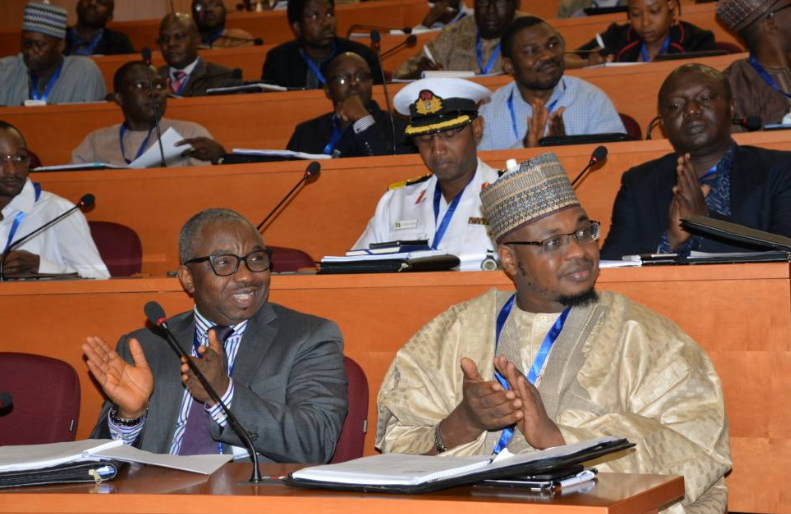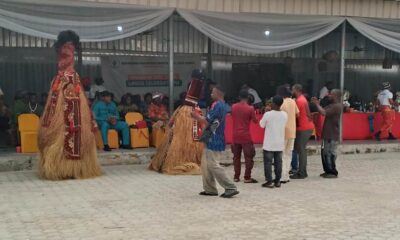GRTech
Exchange of info among MDAs crucial to public service transformation- Pantami


It is an obvious fact that applying information technology (IT) for governance holds tremendous potential to improve the way governments deliver public services.
But, the National Information Technology Development Agency (NITDA) is worried over the Ministries, Departments and Agencies’ (MDAs) approach to e-government which has been in silos.
NITDA’s DG, Dr. Isa Pantami, stated the Agency’s position at Stakeholders’ Engagement on Nigeria e-Government Interoperability Framework (Ne-GIF), held in Abuja on Tuesday.
He said, it is worthy to note that seamless exchange of Information between various MDAs’ IT infrastructure and applications is critical to cross-portfolio service delivery and public service transformation.
However, NITDA is committed to change the narrative by working closely with stakeholders to remove existing barriers caused by silo deployment of IT solutions. The barriers have made information sharing a nightmare among MDAs.
NITDA was established in 2001 to implement National Information Technology Policy, give effect to provisions of the NITDA Act, 2007 and coordinate general IT development and regulation in the country.
Pantami’s message at the occasion:
“We recognize the enormity of the responsibilities placed on the Agency as well as the possibilities of IT or e-Government as a development resource for achieving socio-economic transformation. e-Government and ICT tools can among other things, cut down the cost of governance, improve national economic growth; enhance access and quality of services as well as render public agencies more transparent and accountable.
Accordingly, at this information age, going digital for any government is the optimal route to attain Sustainable Development Goals (SDGs).
Nigeria as a developing country has her own share of good experience of e-Government or ICT adoption for streamlining and improving governance. Such good initiatives where Nigeria has recorded success in using ICT to drive government policies include Treasury Single Account (TSA), Integrated Personnel Payroll Information System (IPPIS), Government Information Financial Management Information System (GIFMIS), Bank Verification Number (BVN), e-Taxation, e-passport, e-wallet for farmers among others.
The implementation of TSA and IPPIS/BVN saves Nigeria N4.7 Billion and N20 Billion respectively every month and assist in the elimination of ghost workers in various MDAs.
However, the Nigerian government is becoming more complex and wide-reaching than ever before and citizens believe and expect that public services must be delivered effectively and at speed.
Silo e-Government systems would not help Government deliver public services efficiently. Advanced phases of service innovation cannot be achieved without integrating many back-office functions.
For instance, registering a Limited by Guarantee Company in Nigeria requires visit to at least three institutions: CAC, FIRS, and Attorney General of the Federation physically and/or through their portals.
This is inefficient, inconvenient, time consuming and makes citizens pay more. Through robust e-Government applications, I t is possible to make the transactions and get the service delivered on a single portal.
Citizen-centered service delivery involves breaking up silos, integrating across agencies, innovating new ways of doing business, and creating a service-focused culture.
It has been proven that one of the strategic directions for e-government is to adopt a Whole-of-Government (WoG) approach for deriving expected value from IT. WoG involves back-end offices re-engineering, consolidation and integration of business processes across government agencies to deliver effective and consolidated services through the front-end offices at an affordable cost.
WoG is a deliberate path to attain Government Digital Transformation (GDT) we desire. GDT views Government as an entity by promoting the idea of ONE GOVERNMENT but still respect individual MDA’s mandates while providing government digital services.
Fundamentally, e-Government or digital service delivery has three models or approaches: Government-to-Government (G2G), Government-to-Business (G2B) and Government-to-Citizens (G2C). Transforming G2G is the foundation for providing efficient digital services. It enables and drives the other delivery models.
However, the workability of any G2G is determined by the level of IT systems integration and standardization considering the social, institutional, legal, economic and political systems of a particular country.
The main difficulty in achieving advanced G2G is the interoperability requirements of IT systems of various government agencies. For instance, compliance with Executive Order 001 requires advanced G2G. A provision in the Executive Order 001 stipulates that “an MDA that requires input documentation, requirements or conditions from another MDA in order to deliver products and services on applications within the originating MDA’s remit or mandate, including permits, licenses, waivers, tax documentation, filings and approvals shall only request a photocopy or other prima facie proof from the applicant.
It shall be the responsibility of the originating MDA to seek verification or certification directly from the issuing MDA”.
How can this happen seamlessly when information is not digitally shared in an efficient manner between MDAs that are involved. This requires advanced G2G to provide the needed services to businesses and citizens.
The Government Digital Transformation Agenda led the Management under my leadership to come up with a Strategic Road Map based on seven-point focus areas: Capacity Building, IT Regulation, Digital Job Creation, Government Digital Service Promotion, Local Content Development and Promotion, Cyber Security and Digital Inclusion.
At least five of these focus areas are geared towards Government Digital Transformation. They are capacity building, government digital services promotion, cybersecurity, IT regulation and local content development and promotion.
Specifically, Government Digital Service Promotion and IT Regulation are targeted at transforming the way government provides digital services thereby making GDT a reality.
This has informed our decision to set up a dedicated department- e-Government Development and Regulation to champion the cause of Government Digital Transformation.
The department has an endorsed Strategy as a guide and template towards achieving the desired GDT. The Strategy is a by-product of the Agency’s Strategic Road Map and Ne-GIF is a critical component of GDT agenda.
Our national peculiarities in terms of multi-tribal society, population, huge demand for accessible public services, new challenges of agitations, security and terrorism among others demand integrated services and collaborative governance.
Moreover, the legitimacy of any government, in this age of knowledge economy and information society, requires full-scale inclusion, participation and co-creation of customized and personalized services for citizens. All these necessitate the shift from a silo-based to a cross-portfolio service delivery approach by Ministries, Departments and Agencies (MDAs).
The shift necessitates integrated policies and programs, collaborative and collective responses to social problems, promotion of shared infrastructure and applications as well as the need to leverage on comparative advantages of various agencies in order to maximize value from e-Government investments.
As mentioned earlier, Ne-GIF is a critical enabler for cross-portfolio services, WoG and GDT agenda.
Way forward
To achieve the needed integration preached by WoG principles, there is a need for a framework that guarantees interoperability of IT infrastructure and applications.
Regrettably, Nigeria, with all her efforts at deploying IT infrastructure and/or e-Government systems, is yet to develop one.
Therefore, the National Information Technology Development Agency (NITDA) whose primary mandate is to regulate and develop IT in the country as stipulated in the NITDA Act of 2007, has developed the draft Nigeria e-Government Interoperability Framework (Ne-GIF) to close the identified gap.
The Agency is presenting the draft Framework before you as our major stakeholders for inputs, comments and corrections. Most importantly, we implore you to own the Framework and ensure its smooth implementation and compliance. Developing the Framework is one thing, compliance and implementation is another.
If we all believe that Interoperability Framework is essential for Government Digital Transformation in Nigeria, I implore us to put resources together for its implementation.
It requires strong political and leadership will by MDAs and collective commitment by all stakeholders in the Public and Private sectors.
The Ne-GIF provides tools, specifications and recommendations that are based on Standards for supporting MDAs in undertaking interoperability of e-government solutions for the provision of cross-portfolio services.
My vision in NITDA is to facilitate and lead government digital transformation and ensure NITDA plays a critical role in building a digitally transformed government.
Leveraging on ICT to ensure seamless information exchange is a prerequisite to achieving ERGP objectives, Sustainable Development Goals by United Nations and attaining our desired Government Digital Transformation Agenda. We need to build capacity and ensure the right leadership is provided across MDAs.
Recently, we have been engaging MDAs and other stakeholders on different fronts.
It, however, requires concerted efforts. We can’t do it alone; we need the support and cooperation of MDAs, IT sector players, the National Assembly and other stakeholders”.
Source: TechEconomy.ng
-



 Entertainment4 days ago
Entertainment4 days agoBeauty Tukura and Sunky O Join The Macallan as Official Brand Influencers
-



 News4 days ago
News4 days agoNtoudi Mouyelo: Ex-PawaTech Executive Faces Criminal Complaints Over Alleged $3.35M Gaming Licence Fraud
-



 Culture3 days ago
Culture3 days agoUmuahia Day 2025 Lagos: Bridging the Gap, Strengthening the Bonds of Brotherhood
-



 Politics3 days ago
Politics3 days agoINEC Engages PDP Leadership to Strengthen Compliance with Electoral Laws









